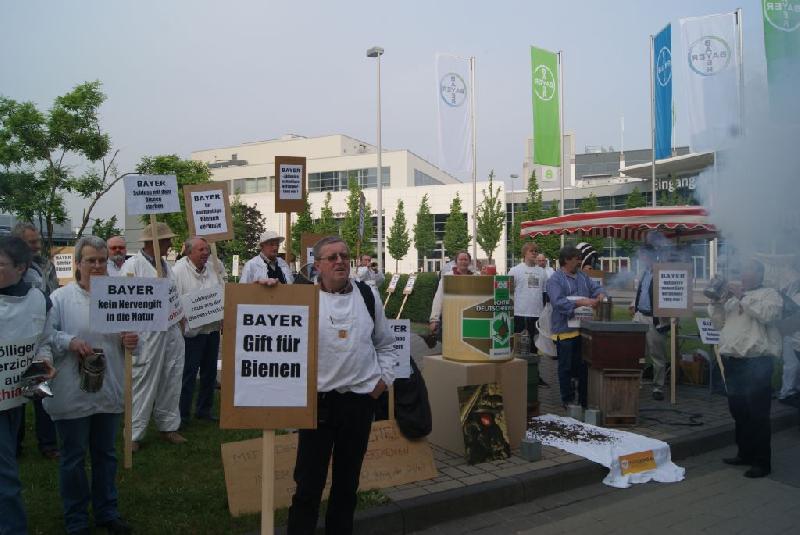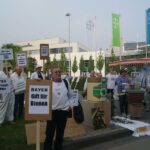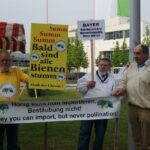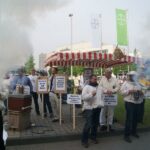Press Release, April 11, 2012
Coalition against BAYER Dangers (Germany)
Countermotion to shareholder meeting:
BAYER Pesticides causing bee decline
The Coalition against BAYER Dangers, based in Germany, has introduced a countermotion to the upcoming BAYER Shareholder Meeting (see BAYER website) and demands that the BAYER Board not be ratified, for knowingly endangering bee populations around the world. The proposal will be discussed within the meeting taking place on April 27 in Cologne (Germany). Beekeepers from all over Europe have announced to protest at the venue.
BAYER pesticides Gaucho (imdacloprid) and Poncho (clothianidin) are responsible for bee mortalities throughout the world. In the past months, several large studies were published that once again show the high risks for bees and wild living insects. Despite this, BAYER has not stopped marketing these agrochemicals for mere profit reasons.
Philipp Mimkes, spokesperson of the Coalition against BAYER Dangers: “Bees are of key importance for the pollination of numerous plants. Bee mortality has far-reaching consequences for global ecology and puts the world‚s basic food supply at risk. Environmental groups have collected 1.2 million signatures in favor of a ban on Gaucho and Poncho. Nevertheless the BAYER Board has done nothing to ensure that these dangerous pesticides are withdrawn from the market to protect nature and biodiversity. For this reason, the actions of its members should not be ratified.“
In December, Dr. Jeffery Pettis, head of the Bee Research Laboratory at the U.S. Department of Agriculture, published a long-awaited study. The findings of the study Pesticide exposure in honey bees results in increased levels of the gut pathogen Nosema confirm the long-time experience of beekeepers all over the world, that minimum sub-lethal exposure to the pesticide Gaucho leads to honey bees being infested significantly more often by parasites. Parasites such as Nosema or Varroa reduce the survivability of bee colonies. Contrary to BAYER‘s repeated assertion, however, parasite infestation is not the cause of bee deaths but is a consequence of the weakening of the insects‚ immune system by pesticides.
In the same month, a study published in the Journal of Environmental & Analytical Toxicology proved that the studies submitted to the authorities by BAYER grossly underestimate the risk of Gaucho and Poncho. Toxicologist Dr. Henk Tennekes, one of the authors, calls for a ban on this class of substances to prevent further bee and bird mortalities.
In January 2012, a study entitled Multiple Routes of Pesticide Exposure for Honey Bees Living Near Agricultural Fields was published by researchers at Purdue University (U.S.). The study shows that bees ingest pesticides such as Poncho in several ways, including via pollen, nectar or seed abrasion. The researchers found the toxin in all the examined bees. This refutes BAYER‘s assertion that bees do not come into direct contact with Poncho. According to the authors, exposure to the pesticide can either lead to immediate death of the bee or to a loss of orientation and interference with communication among the bees themselves. Because of its high persistence, the active ingredient of Poncho remains in the soil for many years and accumulates in wild plants such as the dandelion. The dandelion is an important source of food for insects in spring and autumn. The bees are therefore exposed to the toxic substance throughout the year. This chronic exposure has devastating consequences.
Another study recently published by scientists at Stirling University in Scotland found that growing colonies exposed to the pesticides were smaller and produced 85 per cent fewer Queens which are crucial to their survival as they live through the winter and found new colonies in Spring.
Only last spring, the UN Environment Programme (UNEP) published a report on bee mortalities around the world. Poncho and Gaucho are listed there as a threat to numerous animals. According to the report, „Systemic insecticides such as those used as seed coatings, which migrate from the roots through the entire plant, all the way to the flowers, can potentially cause toxic chronic exposure to non-target pollinators. Various studies revealed the high toxicity of chemicals such as Imidacloprid, Clothianidin, Thiamethoxam and associated ingredients for animals such as cats, fish, rats, rabbits, birds and earthworms. Laboratory studies have shown that such chemicals can cause losses of sense of direction, impair memory and brain metabolism, and cause mortality.“
An internal evaluation by the U.S. Environmental Protection Agency (EPA) that was made public in 2010 describes the studies submitted by BAYER as „inadequate“. According to the EPA memorandum, honey bees in particular are at considerable risk. Because the products registration in the United States is based precisely on these studies, numerous U.S. environmental and beekeeping associations are demanding the registration be withdrawn immediately.
Honeybees pollinate over 70 out of 100 crops that provide 90% of the world‚s food. They pollinate most fruits and vegetables-including apples, oranges, strawberries, onions and carrots. The declining bee population thus has potentially serious impacts on food security and livelihood of farmers. It can also affect the range of food crops that can be grown and consequently the nutritional value and variety of our food supply.
Philipp Mimkes continues: “Although the problems have repeatedly been brought to BAYERs attention for many years, the company has taken no action purely for profit reasons. Although the most dangerous uses for Poncho and Gaucho have been banned in France, Italy and Germany, this does not prevent the corporation from continuing to export these toxic substances to more than 100 countries.
For many years Gaucho and Poncho have been among BAYER‘s top-selling pesticides. In 2010, Gaucho sales were valued at US$ 820 million while Poncho sales were valued at US$ 260 million. Gaucho ranked first among BAYER’s best-selling pesticide, while Poncho ranked seventh. It is striking that in the 2011 Annual Report no sales figures for Gaucho and Poncho are shown.
Campaign for total ban of neonicotinoid pesticides



